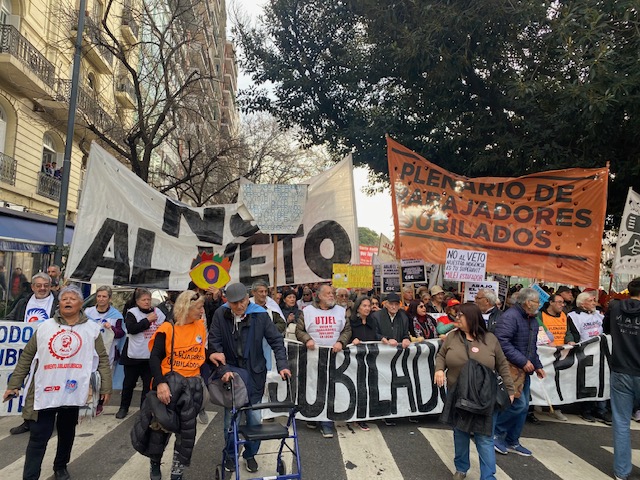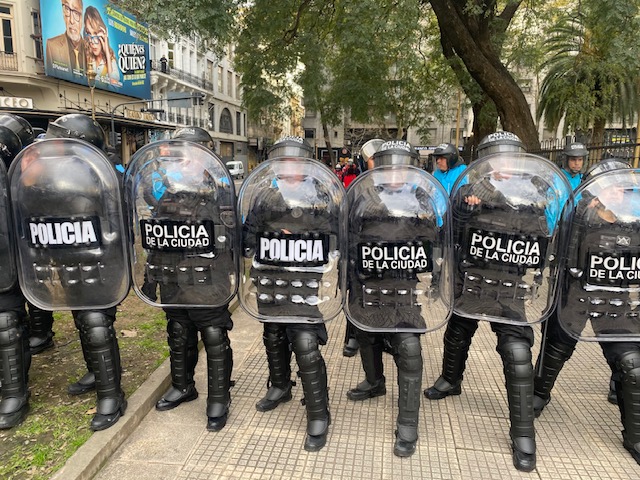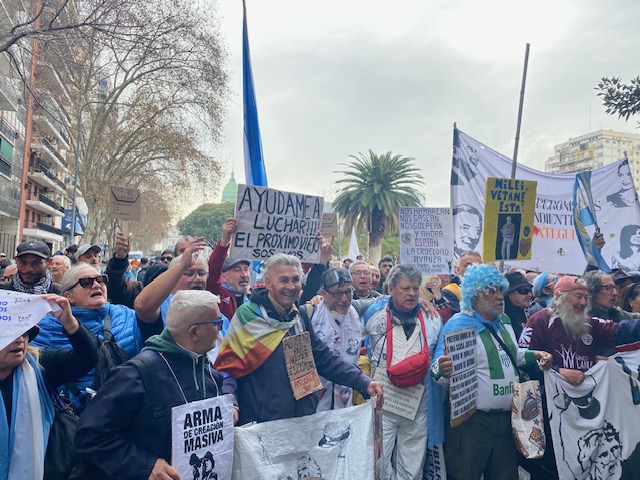Buenos Aires, Argentina — Argentinians on Wednesday gathered outside the country’s Congress to protest President Javier Milei’s decision to block raises in pension and disability funding.
Milei on Monday vetoed three bills which had previously been approved by lawmakers.
The first would have seen a 7.2% increase for all pensions, and would have raised the monthly bonus to 110,000 pesos (approximately USD $80).
The second would have permitted women over 60 years old and men over 65 years of age to retire, even if they had not completed the necessary 30 years of pension contributions.
The third bill would have led to the creation of a pension for people with disabilities, and enabled them to access a medical care program.
Protesters were present at Buenos Aires’ Plaza de Congreso from Wednesday morning, with thousands present by the early afternoon.

Various groups carried out marches around the square, chanting, holding banners and posters. Among the groups who participated in the protests were trade unions, pensioners, healthcare workers, and human rights non-profits.
Protesters held signs with messages such as “Down with the veto” and “No to the veto.” Others included calls for Argentina’s judges to “stop the repression of pensioners,” and for the president and health ministry to provide “help and solidarity.”
One placard claimed: “Our poverty is your surplus,” accusing Milei of being a “scammer”.
Throughout the day, protesters chanted in favor of a general strike and accused Milei of orchestrating a “dictatorship.”
Many protesters, journalists, and first aiders were wearing helmets, goggles, and masks.

Riot police were present throughout the demonstrations, with some streets blocked by rows of officers. The protests unfolded without clashes until just after 4:00 PM, when pepper spray and water cannons were deployed against a group of protesters. A small number of people could be seen receiving medical attention, including demonstrators and first aiders.
At least one journalist was affected by the tear gas. Photojournalist Rodrigo Abd was also hit by a water cannon, which temporarily affected his hearing, according to an interview he gave to Chaco Día Por Día.

Pensioners have been protesting every Wednesday in Buenos Aires’ Plaza de Congreso since February 19. The protests were initially sparked by discontent surrounding retirees’ low state pensions, and have since attracted the support of a range of groups, including soccer fans.
Hundreds of people have reportedly been injured since the demonstrations first began, including photojournalist Pablo Grillo who survived an eight-day coma after being struck in the head by a tear gas canister at a protest in March.
Sara, who chose to withhold her surname for privacy reasons, told Argentina Reports that she attended this Wednesday’s protest because “we are dying of hunger,” something which she says Milei will never see for himself, because “he does not go out in public; he does not walk the streets.”
Today was the first time that Sara, who is a pensioner with a disabled son, was present at a Wednesday protest. She explained why it was important for her to attend, saying: “We have to show up for one another, because the government does nothing for us.”
Acknowledging the strong police presence, she said: “We have to withstand it; we have to resist, because, if we don’t, they defeat us. And we can’t allow them to defeat us.”
Miguel, who has recently turned 83, told Argentina Reports that he first began attending the weekly demonstrations to protest “very low” pensions.
However, now, his motives are much broader. Miguel, who too opted to maintain anonymity by only providing his first name, says Milei’s government is “cruel” and that it “mistreats us, insults all of us.” He accused the government of “starving the people, condemning them to poverty, and selling out to foreign interests.”
“Even if I can’t do anything, at least I can express what I think,” he stated.
Miguel says his family is against him attending the demonstrations because of his age, but says it is important for him to “testify about what we are living through,” saying it is “very important” for him to be present at the protests.
Héctor, a pensioner who attends the protests every week, explained that the protesters were “fighting for different reasons,” though experiencing similar suffering. Pensioners, disabled people, and workers are among the groups who he says are “going through a difficult time, suffering from hunger,” and in some cases “dying of hunger”.
The protest was driven by “the dignity to live,” Héctor, who only provided his first name, explained.
He explained that protesters are accustomed to police presence at the demonstrations, though added: “We do not consider it right that they are here.” He continued: “We are peaceful. In general, we are peaceful. If something happens, it is really the police’s fault rather than ours.”

Alejandro Sapere, a psychologist at Laura Bonaparte Hospital, was also present at the protest. He explained that the hospital recently saw 200 of its 600 staff members laid off. “Because of this, we started organizing and taking to the streets,” he stated.
He said: “This is a government that doesn’t respect children, retirees, people with disabilities, or public healthcare. It’s a government that only serves the powerful.”
Sapere explained that healthcare workers “see pensioners as an example of resistance, because, in many ways, they show us the way forward,” adding: “We always say we have to fight the way the pensioners fight.”
Sapere said that many Argentinians like himself will continue demonstrating, despite the “repression” inflicted upon them, because, “We are a people which has faced many forms of intimidation throughout history.”
He continued: “We lived through a military coup — a civic-military dictatorship […] We follow the path of the Mothers and Grandmothers of Plaza de Mayo — they’ve shown us the way. We are here, fully committed, knowing that rights are defended through struggle.”
Featured images credit: Elizabeth Bratton




